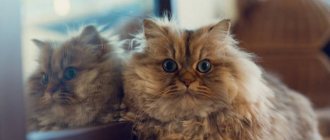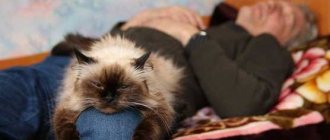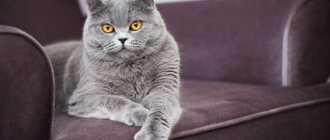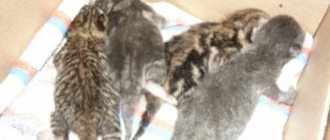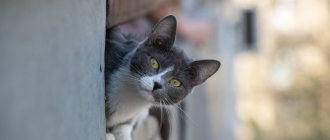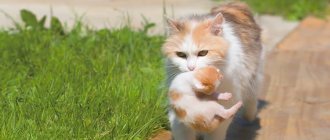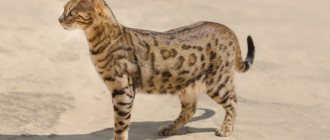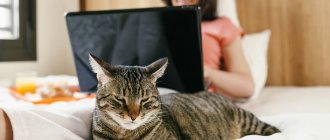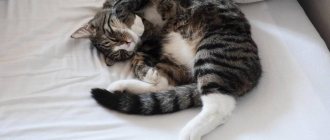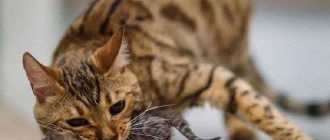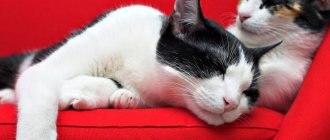Has your cat decided to express its opinion about your hairstyle?
Or maybe, at every opportunity, trying to prove to you that your hair could use a little makeover?
Here's a typical scenario:
you are sleeping when suddenly a strange feeling arises. You instinctively reach your head and feel that part of your hair is... wet. And next to him sits the culprit of this whole situation. A cat who looks at you with surprised eyes and then returns to the activity he previously performed with such passion: licking your hair. Feeling how wet your strands are, you begin to realize that he's been doing this for a long time. And then you wonder, “why is my cat licking the hair on my head?” Let's check what's behind this behavior.
The cat licks your hair because he likes you
- Veterinarians say that licking hair may be a cat's way of expressing its feelings.
- Mutual care is a common bonding behavior between cats. As the owner of at least two pets, you're probably used to seeing cats lick each other.
- In addition, mutual care may be the result of a revival of the maternal instinct. Although this explanation is not fully confirmed in reality. After all, this behavior is also observed in cats.
- Another theory is that this is a way for cats to relax themselves, reducing stress and tension.
Cats that bond very closely with their guardian may make the guardian the target of the above behavior. The focus will automatically be on areas with hair (for example, we have the most of it on our heads). This is completely normal, and if your cat is licking individual strands of hair, there is nothing to worry about. Give him your love and offer him a solid dose of affection. After all, he finally washed your hair.
Causes
A cat can lick the head of any family member for various reasons. The first, and most basic, is a natural craving for cleanliness. This way they are trying to show they care and show that they care about you.
Other reasons:
- The appearance of love. Just as a cat licks its newborn kitten, your pet will lick you too. This ritual, special for them, contains all the tenderness, love and care that only a cat can give you;
- Often, a cat licks the hair, hands or face of the owner in order to get something tasty. When he sees a treat in your hands, the pet shows all his tricks to get it;
- Craving for dominance. Sometimes, an animal wants to show who is boss in the house, and by licking a person, it shows its dominance. Like a mother who takes care of her child in every possible way, a cat shows care for its owner;
- If the cat is very constrained and tense while licking the hair, then this means that the owner completely dominates her. This is a direct signal of the pet feeling uncomfortable; he is tense all the time, and this can negatively affect the animal’s psychological and physical health;
- If your cat is licking the hair on its head, this may indicate that it is simply bored. The tailed friend lacks attention. If such impulses are constant, you should worry about the state of her psychological health and visit a specialist to fully examine and solve the problem;
- If a person has strong and pungent odors, the cat tries to rid him of them. Any cosmetics, perfumes, creams, ointments, and even sweat secretions are perceived harshly by the pet and, in their opinion, are dangerous. Therefore, by licking the owner, the animal wants to protect him and himself from the impending danger;
- Presence of diseases . It is worth examining the cat well, monitoring its behavior and possible accompanying symptoms. Excessive licking may indicate the presence of parasites, dermatitis, allergic reactions, skin irritations, rashes and various infections.
A cat licks a person's hair for its taste or smell.
- According to leading veterinarians, some cats may simply enjoy the taste of the shampoo and other hair products you use. However, if you use hairspray, hair mousse or other styling products, it is best not to let your cat lick your hair. After all, you don’t want him to consume chemicals contained in cosmetics - they can harm him.
- Moreover, the oil produced by the scalp may also seem tasty to pets. Some cats may also be fascinated by the texture of their fur.
Cat Care Basics
Cats have been grooming themselves for thousands of years to stay clean and healthy. Grooming serves several important functions for your pet. It helps keep the coat clean and dry.
This practice is also known to prevent external parasites from entering the fur and skin. When it's hot outside, extra grooming helps cats stay cool. Since they cannot sweat, the moisture on their skin evaporates, aiding in cooling.
The cat licks its owner's hair to mark territory
Whether you've been out all day or just popped into the nearest store, your cat will immediately pick up on the other scents you've picked up along the way. Your furry friend will want to take them off your “fur” so you smell like him. So now you belong to his “domain”. By licking, he marked you, thereby informing other cats (if you have more than one) to stay away from you.
The cat pulls out hair
Sometimes the cat just plays by pulling your hair, which can be quite painful. In this case, you must give a tough rebuff, because if you ignore it, the pet will get used to it and will continue to torment you. In this case, you need to shush the cat, hiss, tell him a forbidding word, or, ultimately, kick him out of bed.
You can do the following experiment: as soon as the cat starts making pretzel tricks with your head, he needs to forbid it with words, but if he doesn’t listen, kick him out of the bedroom. After a few times, he will develop a conditioned reflex that playing with his hair will be followed by being completely removed from your body. Then, perhaps, some time will pass and the cat will stop hurting you, understanding the consequences.
How to stop this behavior?
- If you don't want your cat to lick your hair, try to discourage her from doing so.
- If you pet your cat or talk to him during this training ritual, you will let him know that you approve of this action.
- When your cat tries to lick your hair, let him know that you don't like it. Just get up and walk away from your pet.
- If you think your hair products may be causing you to become overly interested, change them to something else. Your hair may no longer be as attractive to your cat. Cats generally don't like the smell of citrus fruits, so you can try lemon-scented shampoos and body washes.
Why does a cat comb its owner's hair?
Contents hide
Tell me, have you now recognized yourself and your pet? Then, with a high degree of confidence, we can assume that your cat actively uses grooming as one of the main models of social behavior. What does this look like in practice? Something similar is often noticed by owners of several pets. When peace and harmony reign in the house, furry pets love to tidy each other up, lick each other, etc. Cats transfer this model of behavior to their owners, apparently considering them to be part of one big family. What is “licking” in a cat’s understanding? This is the transfer of one’s own scent, a kind of mark in the spirit of “you are only mine.” A large and friendly family, accordingly, should smell the same.
There are also some oddities. A pet can show a completely unexpected, sudden interest in the owner’s hair. And again it's about smells. So, he may “like” your new shampoo or other cosmetic product. Therefore, do not think that a great stylist is sleeping inside your pet. Consider cat care as a compliment: not every person is accepted into a cat family.
Perhaps some time ago you yourself unwittingly reinforced this behavior. It all happened by chance, during play or petting. The cat accidentally touched the hair, in response you encouraged it - stroked it or even gave it a treat. And they themselves did not pay attention to what happened. And the purr connected both of these events in her head and is now trying to please her owner.
But sometimes something pleasant doesn’t come out. The pet tangles its hair and sometimes starts sucking on it. How should we evaluate this behavior? Perhaps we are dealing with some echo of the stress suffered by the animal. In such a unique way, a cat seeks protection and consolation from its owner. Or your “purry” has developed the so-called “pica” - simply put, a perversion of taste. In the first case, try to find out whether the cat might have experienced severe fright or stress. If the matter is a perversion of taste, then, as a rule, the matter is not limited to hair alone - plastic bags, wool, paper, etc. are also used. Some breeds (Siamese, Burmese, Orientals, etc.), by the way, are more likely than others to tend to suck and chew inedible things and objects.
In any case, we do not recommend encouraging such behavior, and here’s why. Surely you have come across “wool balls” - when a cat regurgitates lumps of hair that got into the stomach after washing itself. Now imagine what happens when strands of human hair enter a cat's stomach.
Strictly speaking, taste perversion is a rather serious condition; your pet seriously risks its health. Just in case, be sure to consult your veterinarian.
Provide your pet with alternative options - for example, special soft toys work well. And don't rush to get upset. What if they finally gave you an exquisite compliment?
Based on materials from the publication : Why Do Some Cats Groom Their Owner's Hair? Author: Amy Shojai. Source: thesprucepets.com Photo: pixabay.com
Ringworm and fungi
Ringworm in animals appears as small patches of baldness. In this case, scabs or erosion may be present on the skin, but this depends on the causative agent of the disease.
Quite often, the reason that an animal licks itself more often than usual is a fungal infection. It is impossible to identify the fungus without special equipment, but dry skin and flaking can help you suspect the disease. It is these symptoms that cause discomfort to the cat, in response to which he constantly licks himself, itches and chews his fur.
Upon careful examination, you will notice the following signs on the skin:
- Severe dryness;
- Change in color (pale skin or redness);
- Separation of dense grayish scales;
- Hair thinning;
These symptoms are characteristic of various fungal infections, including lichen. In this case, hair loss can be caused both by the characteristics of the disease and by the actions of the animal itself. Often, in response to itching, cats gnaw out islands of fur, trying to reach the skin with their claws.
Treatment of fungal infections is carried out with the help of antimycotic drugs. Shampoos and ointments used to treat people are usually prescribed - Nizoral, Ketoconazole, Clotrimazole.
Cat eats hair from the floor
Sometimes hair falls from our head straight to the floor. We cannot notice this, nor the fact that the pet found and ate them. This unwanted behavior is difficult to control. Of course, if you see it, you need to stop the cat from doing this and remove the hair from its mouth. But, unfortunately, more often this happens in our absence.
What are the dangers of eating hair? Firstly, a clump of your hair, like your own fur, can get stuck somewhere in the cat's intestines, causing an obstruction. Then he will need to eat grass to pull out or push the mat further. In rare cases, surgery is required.
Reasons why cats lick their owners
If an animal begins to lick its owner, you should not be touched; perhaps the cat is not all right. Factors that provoke the appearance of such behavior may be the following:
- Depressive state. Leaving a cat alone for a long time can lead to boredom. To prevent this condition, it is recommended to devote more time to your pet, play and communicate with it.
- Stressful conditions. Emotional stress is not uncommon for cats. These pets have a labile nervous system and can become nervous even with minor irritating factors. A stressed cat may begin to lick not only the owner’s hands, but also clothes. The cat also actively licks itself, which in some cases leads to the formation of areas of baldness. It is very important to show your pet to a specialist, thereby preventing the development of dangerous skin diseases.
- Allergic type reactions. The reason that makes a cat lick not only its own body, but also the owner’s hands, is the wrong shampoo or food allergies. Experiencing severe itching, the animal tries to distract itself, which leads to a stressful state of the pet’s nervous system and constant licking.
There are also a number of other factors that provoke the appearance of such a habit in a domestic cat as licking its owner. A cat may experience friendly feelings towards its owner.
The mother cat licks her kittens from birth, showing concern for her offspring. As soon as the kitten grows up, he begins to lick his brothers and sisters. If a cat begins to lick its owner, for example his hands, this can be regarded as a sign of caring.
Another reason why a cat licks a person's hands is to indicate who is dominant. Securing rights to territorial boundaries occurs through smell. By licking the owner, the cat leaves a piece of scent, thus proving to all other animals that this is his person. If the cat does not show aggressive feelings, then there is no need to worry about this.
Begging for treats is not uncommon for cats, so they may take such steps as licking the owner's hands. This should not be allowed, as the cat will become completely spoiled and uncontrollable.
The animal must be fed strictly according to its meal schedule. You should not give treats, especially from a human table.
Should you be alarmed when a cat licks a person?
It is immediately worth noting that the pet does not have any mental disorders. And just health problems too. The most plausible explanation for why cats lick humans is as an expression of affection. In addition, the animal tries to mark its owner and leave its scent on him. A pet cannot leave a mark in its usual way.
For defecation in the wrong place, a well-deserved punishment will immediately follow. It is easier for a cat to lick a person. In some cases, the procedure may not seem entirely pleasant. Purrs have a very rough tongue, unlike dogs. But over time you can get used to it. Do not push away or offend the animal.
In parallel with licking a person, a cat can knead him with his paws. This way he calms himself down. This behavior may be characteristic of animals that were weaned early from their mother's breast.
However, this does not explain why cats lick people, because they can knead and suck on a blanket or a stuffed animal. Such “dances” can continue for a long time and you should not pay attention to them.
If you still wonder why cats lick people, it’s worth remembering that their larger relatives live in prides. In addition, if there are several purrs in the house, you can often notice that they lick each other and at the same time chirp and enjoy themselves.
Most likely, if a cat licks a person, it means that she considers him a member of her family, shows care, and expresses tenderness. You shouldn’t constantly think about why cats lick people. There is nothing wrong!
Kitten climbs into man's hair
When the kitten has eaten, played and is about to take a nap, the baby gets a special pleasure from playing with the owner’s hair. Fluffy hair reminds the pet of early infancy, when the cub associated warmth, food and protection with thick maternal fur.
Often the kitten instinctively buries itself and looks for a source of milk in its hair, since it is accustomed to doing this in the first weeks after birth. This behavior is especially characteristic of the smallest pets that have been separated from their mother. Until the kittens grow up enough and forget about breastfeeding, from time to time the babies will look for their mother's nipple.
Lack of necessary substances: the cat licks the owner’s ears
As strange as it may sound, some cats lick their owners' ears to get to the earwax. There is an opinion that it attracts them not by taste, but by smell. The substance produced by the sulfur glands of the external auditory canal in the ears of people is dead cells containing protein and a special odorous secretion. It reminds animals of a nutritious protein environment that they can get enough of.
Your cat's nocturnal patterns
These harmless or even flattering habits can disrupt your sleep. A cat's restlessness at night can be explained by its ingrained tendency to constantly scour for food. Cats do not have the daily sleep-wake cycle that we and many other animals have, and instead sleep and wake frequently throughout the day and night.
Cats in the wild must hunt 20 small prey each day and must be able to rest between each hunt. Although domestic cats do not eat this way, they maintain the same internal clock as their wild cousins.
